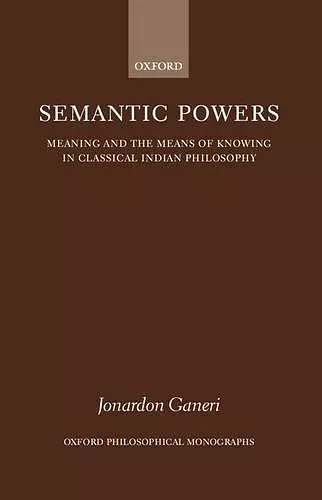Semantic Powers
Meaning and the Means of Knowing in Classical Indian Philosophy
Format:Hardback
Publisher:Oxford University Press
Published:25th Mar '99
Currently unavailable, and unfortunately no date known when it will be back

Jonardon Ganeri defends a conception of language as essentially a means for the reception of knowledge through testimony. He argues that the possibility of testimony constrains the form of a theory of meaning. In particular, the semantic power of a word, its ability to stand for or take the place of a thing, derives from the epistemic powers of understanders, their capacity to acquire knowledge simply by understanding what is said. Ganeri finds this account in the work of certain Indian philosophers of language, those belonging to the late classical school of Navya-Ny(ya. He presents a detailed analysis of their theories, paying particular attention to the influential seventeenth-century philosopher Gad(dhara. Ganeri examines the Indian account of the meaning relation and its relata, the role of modes of thought as meaning constituents, and the application of the theory to theoretical names and anaphora. The aim of Semantic Powers is to give epistemology a central place in the study of language. It also shows how classical Indian theory of language can inform and be informed by contemporary philosophy.
I urge philosphers of language to read this book to become apprised of the classical Indian theorizing at its most sophisticated stage * Stephen H. Phillips, Dept of Philosophy, University of Texas, Mind, Vol.110, No.439 *
to be recommended for all serious students of Indian philosophy as well as for the targeted professional philosopher who knows little or nothing about classical India * Stephen H. Phillips, Dept of Philosophy, University of Texas, Mind, Vol.110, No.439 *
Jonardon Ganeri has brought to scholarly accessibility the communication theory of a seventeenth-century philosopher who is practically unknown out-side the sphere of traditional Sanskrit learning * Stephen H. Phillips, Dept of Philosophy, University of Texas, Mind, Vol.110, No.439 *
Ganeri has succeeded remarkably well in "translating" Navya-Nyaya thought into contemporary idiom and debate in areas where it presents a real contribution to modern concerns in linguistics and philosophy of language ... a penetrating and impressive analysis of a difficult area of classical Indian philosophy presented in a contemporary light. It should provide stimulating reading for philosophers, linguists and Indologists alike. * Eivind Kahrs, THES 17/3/00 *
ISBN: 9780198237884
Dimensions: 225mm x 144mm x 20mm
Weight: 452g
280 pages